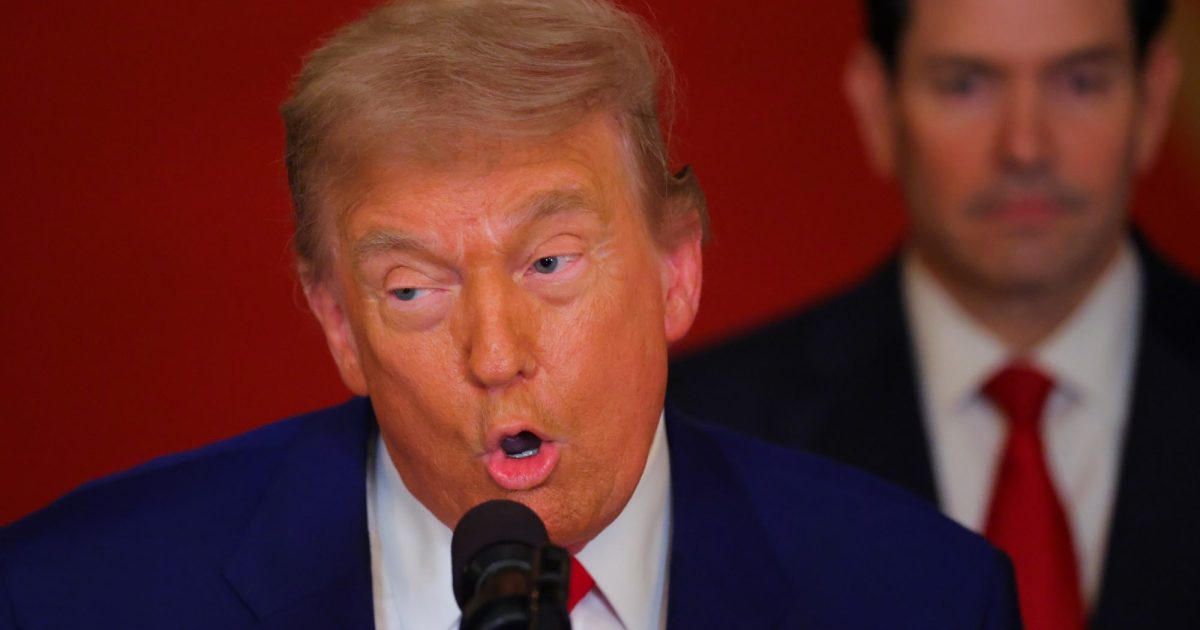On Saturday night, President Donald Trump announced to the world that the US carried out what he called “massive precision strikes” on three nuclear facilities in Iran. The announcement put an end to over a week of speculation about whether Trump would join Israel’s offensive; just Wednesday, Trump told reporters, “Nobody knows what I’m going to do.”
Trump’s attack came as a boon for Israel, which launched its Iran campaign on June 13 and has been lobbying the US to get involved ever since. Israeli Prime Minister Benjamin Netanyahu said Trump’s decision to strike the nuclear facilities “will change history,” adding, “the forces of civilization thank you.”
But as my colleague Dan Friedman points out, Democratic members of Congress—and a few Republicans—decried Trump’s decision, saying he flouted the obligation, imposed by the 1973 War Powers Act, to notify Congress before undertaking such an action. They also argued that the available intelligence did not support the theory that Iran possessed a nuclear bomb.
Indeed, National Intelligence Director Tulsi Gabbard previously told Congress in March that Iran had not built a nuclear weapon; this week, Trump said, “she’s wrong” when asked about her previous testimony. Polling has also shown weak support around the US for strikes on Iran: A Washington Post poll conducted this week showed 45 percent of Americans opposed the idea, compared to only 25 percent who said they supported it and 30 percent who said they were unsure. (A much higher percentage of Democrats, 67 percent, opposed strikes, compared to only 24 percent of Republicans.)
“President Trump misled the country about his intentions, failed to seek congressional authorization for the use of military force and risks American entanglement in a potentially disastrous war in the Middle East,” House Minority Leader Hakeem Jeffries (D-N.Y.) said in a statement after Trump announced the strikes.
Rep. Alexandria Ocasio-Cortez (D-N.Y.) said that Trump’s decision to drop the bombs in Iran “is absolutely and clearly grounds for impeachment.”
“He has impulsively risked launching a war that may ensnare us for generations,” she added.
On ABC’s This Week, Rep. Jim Himes (D-Conn.), the top Democrat on the House Intelligence Committee, said it is “way, way too early to tell” whether or not the strikes had, in fact, “obliterated” Iran’s nuclear program, as Trump claimed. (Indeed, on Sunday, top Pentagon officials agreed that it was “too early” to say whether Iran may retain any nuclear capability.)
“The president has taken a massive, massive gamble here,” Himes added. “I’m, as a member of Congress, disturbed that this was undertaken without congressional approval. There’s not much ambiguity in the in the Constitution about who gets to approve these things.” (Article 1 of the Constitution grants Congress the power to declare war; Article II gives the president the power to command the military when war has been declared.)
On CNN’s State of the Union on Sunday morning, Sen. Adam Schiff (D-Calif.) also said the strikes were “not constitutional,” adding that intelligence did not support the theory that Iran had a nuclear bomb. “The administration should have come to Congress…there’s a reason to bring this to Congress, and it is, you want the Congress bought in, you want the American people bought in on an action this substantial that could lead to a major outbreak of war,” Schiff said.
While most Republicans who have spoken out voiced their support for Trump’s move, a handful also weighed in to oppose the strikes. “This is not constitutional,” Rep. Thomas Massie (R-Ky.) said in a post on X, in response to Trump’s announcement. “I’m amazed at the mental gymnastics being undertaken by neocons in DC (and their social media bots) to say we aren’t at war… so they can make war,” he wrote in another post. Trump quickly attacked Massie on Truth Social, calling him a “loser.”
Massie and Rep. Ro Khana (D-Calif.) introduced a resolution this week that would block US military action against Iran “unless explicitly authorized by a declaration of war or specific authorization for use of military force against Iran” passed by Congress. That measure, offered before the attack, appeared to be picking up support on Sunday, as various Democrats said they were signing on.
Rep. Warren Davidson (R-Ohio) said, “it’s hard to conceive a rationale that’s Constitutional,” in response to Trump’s announcement. Former Republican Congressman Adam Kinzinger also said on CNN that he does not agree with the decision.
House Speaker Mike Johnson (R-La.) said Trump “did what he needed to do,” claiming that the president “evaluated that the imminent danger outweighed the time it would take for Congress to act.” He went on to add that Trump “fully respects the Article I power of Congress, and tonight’s necessary, limited, and targeted strike follows the history and tradition of similar military actions under presidents of both parties.”
Other presidents have, indeed, been faced accusations of unilaterally proceeding with military action: Former President Barack Obama was accused of doing so in a military operation in Libya in 2011, former President Bill Clinton when he launched a military operation in Kosovo in 1999. More recently, some members of Congress accused former President Joe Biden of overstepping his power when he launched strikes on Houthi-controlled sites in Yemen last year. But for Trump, the latest move exists as one of many, many ways he has flouted the Constitution and the the rule of law during only five months back in office—including potentially violating the Emoluments Clause of the Constitution by accepting a free jet from Qatar; trying to abolish birthright citizenship; and unconstitutionally detaining people for protesting.
On NBC’s Meet the Press on Sunday, Vice President JD Vance dismissed the allegations that the strikes were unconstitutional. “The president has clear authority to act to prevent the proliferation of weapons of mass destruction, and the worst weapon of mass destruction of them all is nuclear,” he said. “The idea that this was outside of presidential authority, I think any real serious legal person would tell you that’s not true.”
Responding to the allegation that Trump was launching the US into a new war in the Middle East, Vance claimed: “This is not going to be some long, drawn out thing. We’ve got in; we’ve done the job of setting their nuclear program back.”
But that remains to be seen. Iranian Foreign Minister Abbas Araghchi called the US strikes an “outrageous, grave and unprecedented violation” of international law, adding that Iran “reserves all options to defend its security interests and people.” Trump, meanwhile, threatened “tragedy for Iran, far greater than we have witnessed over the past eight days” on Saturday night if the nation refuses to make peace.
Dan Friedman contributed reporting.















